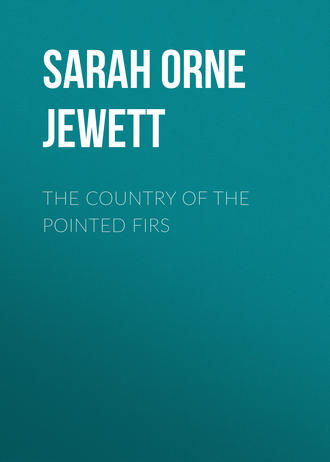 полная версия
полная версияThe Country of the Pointed Firs
“I don’t give that to everybody,” said Mrs. Todd kindly; and I felt for a moment as if it were part of a spell and incantation, and as if my enchantress would now begin to look like the cobweb shapes of the arctic town. Nothing happened but a quiet evening and some delightful plans that we made about going to Green Island, and on the morrow there was the clear sunshine and blue sky of another day.
VIII. Green Island
ONE MORNING, very early, I heard Mrs. Todd in the garden outside my window. By the unusual loudness of her remarks to a passer-by, and the notes of a familiar hymn which she sang as she worked among the herbs, and which came as if directed purposely to the sleepy ears of my consciousness, I knew that she wished I would wake up and come and speak to her.
In a few minutes she responded to a morning voice from behind the blinds. “I expect you’re goin’ up to your schoolhouse to pass all this pleasant day; yes, I expect you’re goin’ to be dreadful busy,” she said despairingly.
“Perhaps not,” said I. “Why, what’s going to be the matter with you, Mrs. Todd?” For I supposed that she was tempted by the fine weather to take one of her favorite expeditions along the shore pastures to gather herbs and simples, and would like to have me keep the house.
“No, I don’t want to go nowhere by land,” she answered gayly,—“no, not by land; but I don’t know’s we shall have a better day all the rest of the summer to go out to Green Island an’ see mother. I waked up early thinkin’ of her. The wind’s light northeast,—‘twill take us right straight out, an’ this time o’ year it’s liable to change round southwest an’ fetch us home pretty, ‘long late in the afternoon. Yes, it’s goin’ to be a good day.”
“Speak to the captain and the Bowden boy, if you see anybody going by toward the landing,” said I. “We’ll take the big boat.”
“Oh, my sakes! now you let me do things my way,” said Mrs. Todd scornfully. “No, dear, we won’t take no big bo’t. I’ll just git a handy dory, an’ Johnny Bowden an’ me, we’ll man her ourselves. I don’t want no abler bo’t than a good dory, an’ a nice light breeze ain’t goin’ to make no sea; an’ Johnny’s my cousin’s son,—mother’ll like to have him come; an’ he’ll be down to the herrin’ weirs all the time we’re there, anyway; we don’t want to carry no men folks havin’ to be considered every minute an’ takin’ up all our time. No, you let me do; we’ll just slip out an’ see mother by ourselves. I guess what breakfast you’ll want’s about ready now.”
I had become well acquainted with Mrs. Todd as landlady, herb-gatherer, and rustic philosopher; we had been discreet fellow-passengers once or twice when I had sailed up the coast to a larger town than Dunnet Landing to do some shopping; but I was yet to become acquainted with her as a mariner. An hour later we pushed off from the landing in the desired dory. The tide was just on the turn, beginning to fall, and several friends and acquaintances stood along the side of the dilapidated wharf and cheered us by their words and evident interest. Johnny Bowden and I were both rowing in haste to get out where we could catch the breeze and put up the small sail which lay clumsily furled along the gunwale. Mrs. Todd sat aft, a stern and unbending lawgiver.
“You better let her drift; we’ll get there ‘bout as quick; the tide’ll take her right out from under these old buildin’s; there’s plenty wind outside.”
“Your bo’t ain’t trimmed proper, Mis’ Todd!” exclaimed a voice from shore. “You’re lo’ded so the bo’t’ll drag; you can’t git her before the wind, ma’am. You set ‘midships, Mis’ Todd, an’ let the boy hold the sheet ‘n’ steer after he gits the sail up; you won’t never git out to Green Island that way. She’s lo’ded bad, your bo’t is,—she’s heavy behind’s she is now!”
Mrs. Todd turned with some difficulty and regarded the anxious adviser, my right oar flew out of water, and we seemed about to capsize. “That you, Asa? Good-mornin’,” she said politely. “I al’ays liked the starn seat best. When’d you git back from up country?”
This allusion to Asa’s origin was not lost upon the rest of the company. We were some little distance from shore, but we could hear a chuckle of laughter, and Asa, a person who was too ready with his criticism and advice on every possible subject, turned and walked indignantly away.
When we caught the wind we were soon on our seaward course, and only stopped to underrun a trawl, for the floats of which Mrs. Todd looked earnestly, explaining that her mother might not be prepared for three extra to dinner; it was her brother’s trawl, and she meant to just run her eye along for the right sort of a little haddock. I leaned over the boat’s side with great interest and excitement, while she skillfully handled the long line of hooks, and made scornful remarks upon worthless, bait-consuming creatures of the sea as she reviewed them and left them on the trawl or shook them off into the waves. At last we came to what she pronounced a proper haddock, and having taken him on board and ended his life resolutely, we went our way.
As we sailed along I listened to an increasingly delightful commentary upon the islands, some of them barren rocks, or at best giving sparse pasturage for sheep in the early summer. On one of these an eager little flock ran to the water’s edge and bleated at us so affectingly that I would willingly have stopped; but Mrs. Todd steered away from the rocks, and scolded at the sheep’s mean owner, an acquaintance of hers, who grudged the little salt and still less care which the patient creatures needed. The hot midsummer sun makes prisons of these small islands that are a paradise in early June, with their cool springs and short thick-growing grass. On a larger island, farther out to sea, my entertaining companion showed me with glee the small houses of two farmers who shared the island between them, and declared that for three generations the people had not spoken to each other even in times of sickness or death or birth. “When the news come that the war was over, one of ‘em knew it a week, and never stepped across his wall to tell the other,” she said. “There, they enjoy it; they’ve got to have somethin’ to interest ‘em in such a place; ‘tis a good deal more tryin’ to be tied to folks you don’t like than ‘tis to be alone. Each of ‘em tell the neighbors their wrongs; plenty likes to hear and tell again; them as fetch a bone’ll carry one, an’ so they keep the fight a-goin’. I must say I like variety myself; some folks washes Monday an’ irons Tuesday the whole year round, even if the circus is goin’ by!”
A long time before we landed at Green Island we could see the small white house, standing high like a beacon, where Mrs. Todd was born and where her mother lived, on a green slope above the water, with dark spruce woods still higher. There were crops in the fields, which we presently distinguished from one another. Mrs. Todd examined them while we were still far at sea. “Mother’s late potatoes looks backward; ain’t had rain enough so far,” she pronounced her opinion. “They look weedier than what they call Front Street down to Cowper Centre. I expect brother William is so occupied with his herrin’ weirs an’ servin’ out bait to the schooners that he don’t think once a day of the land.”
“What’s the flag for, up above the spruces there behind the house?” I inquired, with eagerness.
“Oh, that’s the sign for herrin’,” she explained kindly, while Johnny Bowden regarded me with contemptuous surprise. “When they get enough for schooners they raise that flag; an’ when ‘tis a poor catch in the weir pocket they just fly a little signal down by the shore, an’ then the small bo’ts comes and get enough an’ over for their trawls. There, look! there she is: mother sees us; she’s wavin’ somethin’ out o’ the fore door! She’ll be to the landin’-place quick’s we are.”
I looked, and could see a tiny flutter in the doorway, but a quicker signal had made its way from the heart on shore to the heart on the sea.
“How do you suppose she knows it is me?” said Mrs. Todd, with a tender smile on her broad face. “There, you never get over bein’ a child long’s you have a mother to go to. Look at the chimney, now; she’s gone right in an’ brightened up the fire. Well, there, I’m glad mother’s well; you’ll enjoy seein’ her very much.”
Mrs. Todd leaned back into her proper position, and the boat trimmed again. She took a firmer grasp of the sheet, and gave an impatient look up at the gaff and the leech of the little sail, and twitched the sheet as if she urged the wind like a horse. There came at once a fresh gust, and we seemed to have doubled our speed. Soon we were near enough to see a tiny figure with handkerchiefed head come down across the field and stand waiting for us at the cove above a curve of pebble beach.
Presently the dory grated on the pebbles, and Johnny Bowden, who had been kept in abeyance during the voyage, sprang out and used manful exertions to haul us up with the next wave, so that Mrs. Todd could make a dry landing.
“You don that very well,” she said, mounting to her feet, and coming ashore somewhat stiffly, but with great dignity, refusing our outstretched hands, and returning to possess herself of a bag which had lain at her feet.
“Well, mother, here I be!” she announced with indifference; but they stood and beamed in each other’s faces.
“Lookin’ pretty well for an old lady, ain’t she?” said Mrs. Todd’s mother, turning away from her daughter to speak to me. She was a delightful little person herself, with bright eyes and an affectionate air of expectation like a child on a holiday. You felt as if Mrs. Blackett were an old and dear friend before you let go her cordial hand. We all started together up the hill.
“Now don’t you haste too fast, mother,” said Mrs. Todd warningly; “‘tis a far reach o’ risin’ ground to the fore door, and you won’t set an’ get your breath when you’re once there, but go trotting about. Now don’t you go a mite faster than we proceed with this bag an’ basket. Johnny, there, ‘ll fetch up the haddock. I just made one stop to underrun William’s trawl till I come to jes’ such a fish’s I thought you’d want to make one o’ your nice chowders of. I’ve brought an onion with me that was layin’ about on the window-sill at home.”
“That’s just what I was wantin’,” said the hostess. “I give a sigh when you spoke o’ chowder, knowin’ my onions was out. William forgot to replenish us last time he was to the Landin’. Don’t you haste so yourself Almiry, up this risin’ ground. I hear you commencin’ to wheeze a’ready.”
This mild revenge seemed to afford great pleasure to both giver and receiver. They laughed a little, and looked at each other affectionately, and then at me. Mrs. Todd considerately paused, and faced about to regard the wide sea view. I was glad to stop, being more out of breath than either of my companions, and I prolonged the halt by asking the names of the neighboring islands. There was a fine breeze blowing, which we felt more there on the high land than when we were running before it in the dory.
“Why, this ain’t that kitten I saw when I was out last, the one that I said didn’t appear likely?” exclaimed Mrs. Todd as we went our way.
“That’s the one, Almiry,” said her mother. “She always had a likely look to me, an’ she’s right after business. I never see such a mouser for one of her age. If’t wan’t for William, I never should have housed that other dronin’ old thing so long; but he sets by her on account of her havin’ a bob tail. I don’t deem it advisable to maintain cats just on account of their havin’ bob tails; they’re like all other curiosities, good for them that wants to see ‘m twice. This kitten catches mice for both, an’ keeps me respectable as I ain’t been for a year. She’s a real understandin’ little help, this kitten is. I picked her from among five Miss Augusta Pernell had over to Burnt Island,” said the old woman, trudging along with the kitten close at her skirts. “Augusta, she says to me, ‘Why, Mis’ Blackett, you’ve took and homeliest;’ and, says I, ‘I’ve got the smartest; I’m satisfied.’”
“I’d trust nobody sooner’n you to pick out a kitten, mother,” said the daughter handsomely, and we went on in peace and harmony.
The house was just before us now, on a green level that looked as if a huge hand had scooped it out of the long green field we had been ascending. A little way above, the dark, spruce woods began to climb the top of the hill and cover the seaward slopes of the island. There was just room for the small farm and the forest; we looked down at the fish-house and its rough sheds, and the weirs stretching far out into the water. As we looked upward, the tops of the firs came sharp against the blue sky. There was a great stretch of rough pasture-land round the shoulder of the island to the eastward, and here were all the thick-scattered gray rocks that kept their places, and the gray backs of many sheep that forever wandered and fed on the thin sweet pasturage that fringed the ledges and made soft hollows and strips of green turf like growing velvet. I could see the rich green of bayberry bushes here and there, where the rocks made room. The air was very sweet; one could not help wishing to be a citizen of such a complete and tiny continent and home of fisherfolk.
The house was broad and clean, with a roof that looked heavy on its low walls. It was one of the houses that seem firm-rooted in the ground, as if they were two-thirds below the surface, like icebergs. The front door stood hospitably open in expectation of company, and an orderly vine grew at each side; but our path led to the kitchen door at the house-end, and there grew a mass of gay flowers and greenery, as if they had been swept together by some diligent garden broom into a tangled heap: there were portulacas all along under the lower step and straggling off into the grass, and clustering mallows that crept as near as they dared, like poor relations. I saw the bright eyes and brainless little heads of two half-grown chickens who were snuggled down among the mallows as if they had been chased away from the door more than once, and expected to be again.
“It seems kind o’ formal comin’ in this way,” said Mrs. Todd impulsively, as we passed the flowers and came to the front doorstep; but she was mindful of the proprieties, and walked before us into the best room on the left.
“Why, mother, if you haven’t gone an’ turned the carpet!” she exclaimed, with something in her voice that spoke of awe and admiration. “When’d you get to it? I s’pose Mis’ Addicks come over an’ helped you, from White Island Landing?”
“No, she didn’t,” answered the old woman, standing proudly erect, and making the most of a great moment. “I done it all myself with William’s help. He had a spare day, an’ took right holt with me; an’ ‘twas all well beat on the grass, an’ turned, an’ put down again afore we went to bed. I ripped an’ sewed over two o’ them long breadths. I ain’t had such a good night’s sleep for two years.”
“There, what do you think o’ havin’ such a mother as that for eighty-six year old?” said Mrs. Todd, standing before us like a large figure of Victory.
As for the mother, she took on a sudden look of youth; you felt as if she promised a great future, and was beginning, not ending, her summers and their happy toils.
“My, my!” exclaimed Mrs. Todd. “I couldn’t ha’ done it myself, I’ve got to own it.”
“I was much pleased to have it off my mind,” said Mrs. Blackett, humbly; “the more so because along at the first of the next week I wasn’t very well. I suppose it may have been the change of weather.”
Mrs. Todd could not resist a significant glance at me, but, with charming sympathy, she forbore to point the lesson or to connect this illness with its apparent cause. She loomed larger than ever in the little old-fashioned best room, with its few pieces of good furniture and pictures of national interest. The green paper curtains were stamped with conventional landscapes of a foreign order,—castles on inaccessible crags, and lovely lakes with steep wooded shores; under-foot the treasured carpet was covered thick with home-made rugs. There were empty glass lamps and crystallized bouquets of grass and some fine shells on the narrow mantelpiece.
“I was married in this room,” said Mrs. Todd unexpectedly; and I heard her give a sigh after she had spoken, as if she could not help the touch of regret that would forever come with all her thoughts of happiness.
“We stood right there between the windows,” she added, “and the minister stood here. William wouldn’t come in. He was always odd about seein’ folks, just’s he is now. I run to meet ‘em from a child, an’ William, he’d take an’ run away.”
“I’ve been the gainer,” said the old mother cheerfully. “William has been son an’ daughter both since you was married off the island. He’s been ‘most too satisfied to stop at home ‘long o’ his old mother, but I always tell ‘em I’m the gainer.”
We were all moving toward the kitchen as if by common instinct. The best room was too suggestive of serious occasions, and the shades were all pulled down to shut out the summer light and air. It was indeed a tribute to Society to find a room set apart for her behests out there on so apparently neighborless and remote an island. Afternoon visits and evening festivals must be few in such a bleak situation at certain seasons of the year, but Mrs. Blackett was of those who do not live to themselves, and who have long since passed the line that divides mere self-concern from a valued share in whatever Society can give and take. There were those of her neighbors who never had taken the trouble to furnish a best room, but Mrs. Blackett was one who knew the uses of a parlor.
“Yes, do come right out into the old kitchen; I shan’t make any stranger of you,” she invited us pleasantly, after we had been properly received in the room appointed to formality. “I expect Almiry, here, ‘ll be driftin’ out ‘mongst the pasture-weeds quick’s she can find a good excuse. ‘Tis hot now. You’d better content yourselves till you get nice an’ rested, an’ ‘long after dinner the sea-breeze ‘ll spring up, an’ then you can take your walks, an’ go up an’ see the prospect from the big ledge. Almiry’ll want to show off everything there is. Then I’ll get you a good cup o’ tea before you start to go home. The days are plenty long now.”
While we were talking in the best room the selected fish had been mysteriously brought up from the shore, and lay all cleaned and ready in an earthen crock on the table.
“I think William might have just stopped an’ said a word,” remarked Mrs. Todd, pouting with high affront as she caught sight of it. “He’s friendly enough when he comes ashore, an’ was remarkable social the last time, for him.”
“He ain’t disposed to be very social with the ladies,” explained William’s mother, with a delightful glance at me, as if she counted upon my friendship and tolerance. “He’s very particular, and he’s all in his old fishin’-clothes to-day. He’ll want me to tell him everything you said and done, after you’ve gone. William has very deep affections. He’ll want to see you, Almiry. Yes, I guess he’ll be in by an’ by.”
“I’ll search for him by ‘n’ by, if he don’t,” proclaimed Mrs. Todd, with an air of unalterable resolution. “I know all of his burrows down ‘long the shore. I’ll catch him by hand ‘fore he knows it. I’ve got some business with William, anyway. I brought forty-two cents with me that was due him for them last lobsters he brought in.”
“You can leave it with me,” suggested the little old mother, who was already stepping about among her pots and pans in the pantry, and preparing to make the chowder.
I became possessed of a sudden unwonted curiosity in regard to William, and felt that half the pleasure of my visit would be lost if I could not make his interesting acquaintance.
IX. William
MRS. TODD HAD taken the onion out of her basket and laid it down upon the kitchen table. “There’s Johnny Bowden come with us, you know,” she reminded her mother. “He’ll be hungry enough to eat his size.”
“I’ve got new doughnuts, dear,” said the little old lady. “You don’t often catch William ‘n’ me out o’ provisions. I expect you might have chose a somewhat larger fish, but I’ll try an’ make it do. I shall have to have a few extra potatoes, but there’s a field full out there, an’ the hoe’s leanin’ against the well-house, in ‘mongst the climbin’-beans.” She smiled and gave her daughter a commanding nod.
“Land sakes alive! Le’s blow the horn for William,” insisted Mrs. Todd, with some excitement. “He needn’t break his spirit so far’s to come in. He’ll know you need him for something particular, an’ then we can call to him as he comes up the path. I won’t put him to no pain.”
Mrs. Blackett’s old face, for the first time, wore a look of trouble, and I found it necessary to counteract the teasing spirit of Almira. It was too pleasant to stay indoors altogether, even in such rewarding companionship; besides, I might meet William; and, straying out presently, I found the hoe by the well-house and an old splint basket at the woodshed door, and also found my way down to the field where there was a great square patch of rough, weedy potato-tops and tall ragweed. One corner was already dug, and I chose a fat-looking hill where the tops were well withered. There is all the pleasure that one can have in gold-digging in finding one’s hopes satisfied in the riches of a good hill of potatoes. I longed to go on; but it did not seem frugal to dig any longer after my basket was full, and at last I took my hoe by the middle and lifted the basket to go back up the hill. I was sure that Mrs. Blackett must be waiting impatiently to slice the potatoes into the chowder, layer after layer, with the fish.
“You let me take holt o’ that basket, ma’am,” said the pleasant, anxious voice behind me.
I turned, startled in the silence of the wide field, and saw an elderly man, bent in the shoulders as fishermen often are, gray-headed and clean-shaven, and with a timid air. It was William. He looked just like his mother, and I had been imagining that he was large and stout like his sister, Almira Todd; and, strange to say, my fancy had led me to picture him not far from thirty and a little loutish. It was necessary instead to pay William the respect due to age.
I accustomed myself to plain facts on the instant, and we said good-morning like old friends. The basket was really heavy, and I put the hoe through its handle and offered him one end; then we moved easily toward the house together, speaking of the fine weather and of mackerel which were reported to be striking in all about the bay. William had been out since three o’clock, and had taken an extra fare of fish. I could feel that Mrs. Todd’s eyes were upon us as we approached the house, and although I fell behind in the narrow path, and let William take the basket alone and precede me at some little distance the rest of the way, I could plainly hear her greet him.
“Got round to comin’ in, didn’t you?” she inquired, with amusement. “Well, now, that’s clever. Didn’t know’s I should see you to-day, William, an’ I wanted to settle an account.”
I felt somewhat disturbed and responsible, but when I joined them they were on most simple and friendly terms. It became evident that, with William, it was the first step that cost, and that, having once joined in social interests, he was able to pursue them with more or less pleasure. He was about sixty, and not young-looking for his years, yet so undying is the spirit of youth, and bashfulness has such a power of survival, that I felt all the time as if one must try to make the occasion easy for some one who was young and new to the affairs of social life. He asked politely if I would like to go up to the great ledge while dinner was getting ready; so, not without a deep sense of pleasure, and a delighted look of surprise from the two hostesses, we started, William and I, as if both of us felt much younger than we looked. Such was the innocence and simplicity of the moment that when I heard Mrs. Todd laughing behind us in the kitchen I laughed too, but William did not even blush. I think he was a little deaf, and he stepped along before me most businesslike and intent upon his errand.
We went from the upper edge of the field above the house into a smooth, brown path among the dark spruces. The hot sun brought out the fragrance of the pitchy bark, and the shade was pleasant as we climbed the hill. William stopped once or twice to show me a great wasps’-nest close by, or some fishhawks’-nests below in a bit of swamp. He picked a few sprigs of late-blooming linnaea as we came out upon an open bit of pasture at the top of the island, and gave them to me without speaking, but he knew as well as I that one could not say half he wished about linnaea. Through this piece of rough pasture ran a huge shape of stone like the great backbone of an enormous creature. At the end, near the woods, we could climb up on it and walk along to the highest point; there above the circle of pointed firs we could look down over all the island, and could see the ocean that circled this and a hundred other bits of island ground, the mainland shore and all the far horizons. It gave a sudden sense of space, for nothing stopped the eye or hedged one in,—that sense of liberty in space and time which great prospects always give.






